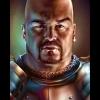To do this, they're simplifying and/or clarifying various elements of the game (although it should be noted that the Essentials products are intended to be full compatible and balanced with previous 4th Edition books), and re-introducing certain elements of previous editions (though more as flavour, rather than directly re-introducing old rules).
One of the most striking examples of both is the new approach to classes. With most classes in D&D, normally you would have to choose all of your at-will powers, encounter powers, daily powers, and utility powers; there are of course exceptions to this, such as the warlock (no choice in at-wills) and the three Power Point-using psionic classes (no encounter powers). This can be somewhat overwhleming due to the sheer number of options, especially if the DM allows material from outside the Player's Handbook. In the Essentials books, some classes eliminate one or more of these categories entirely, while others will dictate which powers you gain based on your choice of build and/or class feature. For example, fighters and rogues no longer have encounter or daily powers, while clerics now receiver encounter powers based on their domain.
Essentials also simplifies the way many powers work. For instance, fighter and rogue at-will powers are no longer attacks. Instead, the fighter receives at-will minor action stances that modify his basic attacks until he ends the stance (which means they affect his opportunity attacks). The rogue receives at-will move actions, which modify the next basic attack he makes during the current turn (so they don't affect his opportunity attacks, but if he spends an action point he can have two active at once.)
Builds appear to be being designed to appeal to old school fans, e.g. the aforementioned cleric domains, one of the fighter builds being called the knight, one of the rogue builds being the thief (the thief even has an ability called backstab!), and one of the wizard builds being the mage. Heck, even the class overviews in the previews resemble the 3rd Edition style previews
Here are the current previews, freely available even to non-subscribers:
Cleric: Warpriest
Fighter: Knight, slayer
Rogue: Thief
Wizard: Mage
Personally, I both like and dislike the changes. I like the new approach to fighter and rogue at-will powers, but dislike the removal of their encounter and daily attacks. I like the re-introduction of cleric domains as a class feature, but I dislike the fact they dictate your encounter powers - they really should just add bonuses to certain powers instead, just like the Rogue Tactics and the warlock's Eldritch Pact class features. Oh, and WotC including the word 'Forgotten' in the name of any product not to do with the Forgotten Realms is just downright silly
Edited by NiGHTMARE, 18 August 2010 - 03:01 AM.












